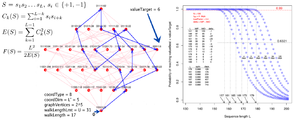Difference between revisions of "B.labs"
(→Low-Autocorrelation Binary Sequences Problem) |
(→Crowd-sourcing) |
||
| (16 intermediate revisions by 2 users not shown) | |||
| Line 1: | Line 1: | ||
= Low-Autocorrelation Binary Sequences Problem = | = Low-Autocorrelation Binary Sequences Problem = | ||
| − | <htmltag tagname="object" type="text/html" data=" | + | == Puzzle == |
| + | |||
| + | <htmltag tagname="object" type="text/html" data="https://labraj.feri.um.si/labspuzzle/" width="800" height="500"></htmltag> | ||
| + | |||
| + | == Crowd-sourcing == | ||
| + | A crowd-sourcing [http://evode.feri.um.si EvoDE] server has been implemented to facilitate experimentation and push the frontiers on finding new best-known values for the labs problem. | ||
| + | The lssOrel solver is running within a web browser. Thus, this problem can be solved on various devices that are in different locations. | ||
| + | |||
| + | If you want to help us, please visit the following link: http://evode.feri.um.si. | ||
| + | |||
| + | On your personal computers it is advised to use Firefox or Pale Moon web browsers. | ||
== Publication == | == Publication == | ||
| − | B. Bošković, F. Brglez | + | <table><tr><td colspan="2"> |
| + | {{cite | | ||
| + | authors = B. Bošković, F. Brglez, J. Brest | | ||
| + | title = Low-Autocorrelation Binary Sequences: On Improved Merit Factors and Runtime Predictions to Achieve Them | | ||
| + | url = http://www.sciencedirect.com/science/article/pii/S1568494617301023 | | ||
| + | journal =Applied Soft Computing | | ||
| + | year = 2017 | | ||
| + | volume = 56 | | ||
| + | issue = ?? | | ||
| + | pages = 262–285 | | ||
| + | citetype = Article | | ||
| + | arxiv = http://arxiv.org/abs/1406.5301 | | ||
| + | name = BoskovicLABS | | ||
| + | doi = 10.1016/j.asoc.2017.02.024 | ||
| + | }} | ||
| + | </td><td rowspan="2">[[File:LABSabstract.png|link=|300px]]</td></tr> | ||
| + | <tr><td> | ||
| + | <htmltag tagname="object" height="50" data="https://api.elsevier.com/content/abstract/citation-count?doi=10.1016/j.asoc.2017.02.024&httpAccept=text/html&apiKey=3b1133e7e3f34750a7acf86daf71927b"></htmltag> | ||
| + | </td><td align="left" valign="top" width="100%">[https://audioslides.elsevier.com/ViewerSmall.aspx?doi=10.1016/j.asoc.2017.02.024&Source=0&resumeTime=0&resumeSlideIndex=0&width=800&height=639 Slides]</td></tr></table> | ||
== Software and solutions == | == Software and solutions == | ||
Comprehensive tables of best-known-value solutions, the number of unique solutions in canonic form and the solutions themselves, the source code of relevant solvers, customized for the labs problem are available on [https://github.com/borkob/git_labs GitHub]. | Comprehensive tables of best-known-value solutions, the number of unique solutions in canonic form and the solutions themselves, the source code of relevant solvers, customized for the labs problem are available on [https://github.com/borkob/git_labs GitHub]. | ||
| − | + | [[Category:Borko_Bošković]] | |
| − | |||
| − | |||
[[Category:Projects]] | [[Category:Projects]] | ||
[[Category:Research activity]] | [[Category:Research activity]] | ||
[[sl:B.labs]] | [[sl:B.labs]] | ||
Latest revision as of 11:26, 3 May 2018
Contents
Low-Autocorrelation Binary Sequences Problem
Puzzle
Crowd-sourcing
A crowd-sourcing EvoDE server has been implemented to facilitate experimentation and push the frontiers on finding new best-known values for the labs problem. The lssOrel solver is running within a web browser. Thus, this problem can be solved on various devices that are in different locations.
If you want to help us, please visit the following link: http://evode.feri.um.si.
On your personal computers it is advised to use Firefox or Pale Moon web browsers.
Publication
|
(arXiv,pdf) B. Bošković, F. Brglez, J. Brest. Low-Autocorrelation Binary Sequences: On Improved Merit Factors and Runtime Predictions to Achieve Them. Applied Soft Computing, 2017, vol. 56, pp. 262–285. DOI 10.1016/j.asoc.2017.02.024.
|  | |
|
| Slides | |
Software and solutions
Comprehensive tables of best-known-value solutions, the number of unique solutions in canonic form and the solutions themselves, the source code of relevant solvers, customized for the labs problem are available on GitHub.